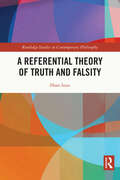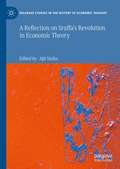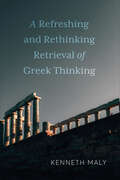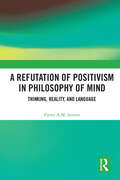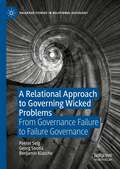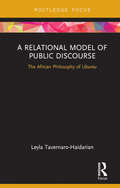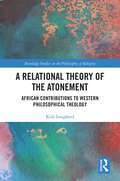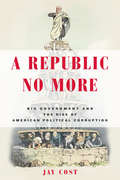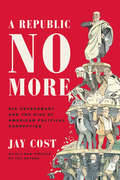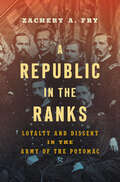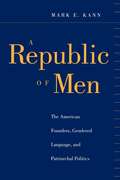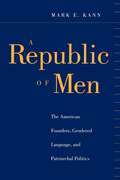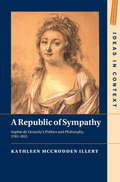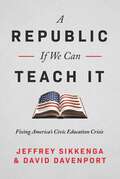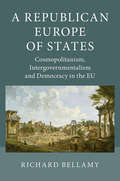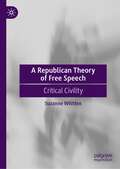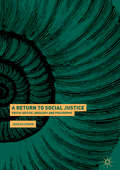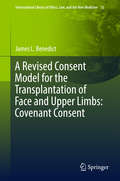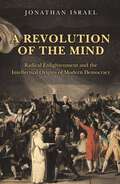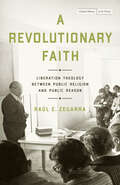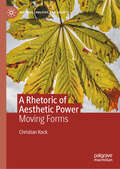- Table View
- List View
A Reconciliation without Recollection?: An Investigation of the Foundations of Aboriginal Law in Canada (G - Reference, Information And Interdisciplinary Subjects Ser.)
by Joshua Ben NicholsThe current framework for reconciliation between Indigenous peoples and the Canadian state is based on the Supreme Court of Canada’s acceptance of the Crown’s assertion of sovereignty, legislative power, and underlying title. The basis of this assertion is a long-standing interpretation of Section 91(24) of Canada’s Constitution, which reads it as a plenary grant of power over Indigenous communities and their lands, leading the courts to simply bypass the question of the inherent right of self-government. In A Reconciliation without Recollection, Joshua Ben David Nichols argues that if we are to find a meaningful path toward reconciliation, we will need to address the history of sovereignty without assuming its foundations. Exposing the limitations of the current model, Nichols carefully examines the lines of descent and association that underlie the legal conceptualization of the Aboriginal right to govern. Blending legal analysis with insights drawn from political theory and philosophy, A Reconciliation without Recollection is an ambitious and timely intervention into one of the most pressing concerns in Canada.
A Referential Theory of Truth and Falsity (Routledge Studies in Contemporary Philosophy)
by Ilhan InanThis book proposes a novel theory of truth and falsity. It argues that truth is a form of reference and falsity is a form of reference failure. Most of the philosophical literature on truth concentrates on certain ontological and epistemic problems. This book focuses instead on language. By utilizing the Fregean idea that sentences are singular referring expressions, the author develops novel connections between the philosophical study of truth and falsity and the huge literature in the philosophy of language on the notion of reference. The first part of the book constructs the author’s theory and argues for it in length. Part II addresses the ways in which the theory relates to and is different from some of the basic theories of truth. Part III takes up how to account for the truth of sentences with logical operators and quantifiers. Finally, Part IV discusses the applications and implications of the theory for longstanding problems in philosophy of language, metaphysics and epistemology. A Referential Theory of Truth and Falsity will appeal to researchers and advanced students working in philosophy of language, epistemology, metaphysics, and linguistics.
A Reflection on Sraffa’s Revolution in Economic Theory (Palgrave Studies in the History of Economic Thought)
by Ajit SinhaThis book presents a substantial collection of essays from a wide range of well respected scholars addressing several aspects of Piero Sraffa’s economics in light of continuing controversies over the interpretation that should be placed on his work. It moves beyond extant scholarship with an added emphasis on the philosophical dimension of Sraffa’s seminal work, Production of Commodities by Means of Commodities. Contributors probe new ways of thinking about the political economy of Sraffa and in doing so, alongside the comments to each contribution by other scholars, provide a cutting edge debate and discussion on non-mainstream economic theory.This book will be of interest to academics and advanced graduate students in economics, with additional interest from scholars in philosophy and the methodology of science.
A Refreshing and Rethinking Retrieval of Greek Thinking (New Studies in Phenomenology and Hermeneutics)
by Kenneth MalyA Refreshing and Rethinking Retrieval of Greek Thinking presents a rereading and rethinking of Greek philosophy in an attempt to retrieve an essential thread in Greek thinking that has been covered over for many centuries – beginning with the late Greeks, then Christianity, and then rationalism – and misrepresented by mistranslations from the seventeenth century onward . Using Heidegger’s work with Greek thinking as a springboard, the book shows how the covering over of this essential thread happened. Kenneth Maly provides a frame by which those not trained in philosophy and phenomenology of experience can grasp the wider import of this rethinking of Greek philosophy. The book delves deep into key questions, preparing readers for extensive and more technical work with the key Greek words and their meanings, hidden for centuries. It includes a significant investigation of how this task requires a different way of language, how early Western thinking mirrors non-Western Daoism and Buddhism, and how quantum physics gets to the same place in its "philosophy," with an emphasis on the work of David Bohm. In doing so, the book reveals how Daoism, Buddhism, the quantum potential of quantum physics, and Heidegger’s being-beyng are all mirrored in Greek philosophy, above all in early Greek thinking.
A Refutation of Positivism in Philosophy of Mind: Thinking, Reality, and Language
by Pieter A.M. SeurenThis book argues that positivism, though now the dominant paradigm for both the natural and the human sciences, is intrinsically unfit for the latter. In particular, it is unfit for linguistics and cognitive science, where it is ultimately self-destructive, since it fails to account for causality, while the mind, the primary object of research of the human sciences, cannot be understood unless considered to be an autonomous causal force. Author Pieter Albertus Maria Seuren, who died shortly after this manuscript was finished and after a remarkable career, reviews the history of this issue since the seventeenth century. He focuses on Descartes, Leibniz, British Empiricism and Kant, arguing that neither cognition nor language can be adequately accounted for unless the mind is given its full due. This implies that a distinction must be made—following Alexius Meinong, but against Russell and Quine—between actual and virtual reality. The latter is a product of the causally active mind and a necessary ingredient for the setting up of mental models, without which neither cognition nor language can function. Mental models are coherent sets of propositions, and can be wholly or partially true or false. Positivism rules out mental models, blocking any serious semantics and thereby reducing both language and cognition to caricatures of themselves. Seuren presents a causal theory of meaning, linking up language with cognition and solving the old question of what meaning actually amounts to. Key Features: Provides a fundamental reassessment of the methodology of the humanities Makes a distinctive contribution to the conceptual foundations of linguistics and philosophy of mind Explores the philosophical and historical origins of central developments in the human sciences in the past 100 years Offers a new approach to ontology and epistemology in the scientific study of the creative human mind and its products.
A Refutation of Positivism in Philosophy of Mind: Thinking, Reality, and Language
by Pieter A.M. SeurenThis book argues that positivism, though now the dominant paradigm for both the natural and the human sciences, is intrinsically unfit for the latter. In particular, it is unfit for linguistics and cognitive science, where it is ultimately self-destructive, since it fails to account for causality, while the mind, the primary object of research of the human sciences, cannot be understood unless considered to be an autonomous causal force. Author Pieter Albertus Maria Seuren, who died shortly after this manuscript was finished and after a remarkable career, reviews the history of this issue since the seventeenth century. He focuses on Descartes, Leibniz, British Empiricism and Kant, arguing that neither cognition nor language can be adequately accounted for unless the mind is given its full due. This implies that a distinction must be made—following Alexius Meinong, but against Russell and Quine—between actual and virtual reality. The latter is a product of the causally active mind and a necessary ingredient for the setting up of mental models, without which neither cognition nor language can function. Mental models are coherent sets of propositions, and can be wholly or partially true or false. Positivism rules out mental models, blocking any serious semantics and thereby reducing both language and cognition to caricatures of themselves. Seuren presents a causal theory of meaning, linking up language with cognition and solving the old question of what meaning actually amounts to.Key Features: Provides a fundamental reassessment of the methodology of the humanities Makes a distinctive contribution to the conceptual foundations of linguistics and philosophy of mind Explores the philosophical and historical origins of central developments in the human sciences in the past 100 years Offers a new approach to ontology and epistemology in the scientific study of the creative human mind and its products.
A Relational Approach to Governing Wicked Problems: From Governance Failure to Failure Governance (Palgrave Studies in Relational Sociology)
by Peeter Selg Georg Sootla Benjamin KlascheThe book initiates a relational turn in policy making and governance by developing further relational political analysis and by taking relational thinking to bear on not just analytic/descriptive issues, but also to normative/prescriptive issues. The need for such a turn, this book argues, comes from the ever-increasing relevance of addressing the so-called wicked problems of governance like climate change, COVID-19 kinds of pandemics, global economic recessions and refugee crises. The book argues for a need to rethink governance as a process from the relational point of view to spur its potential for addressing these problems. What needs to be rethought is not so much the specific tools or resources of governance, but the very issue of whether governance should be seen in terms of tools and resources in the first place. This book contributes to this discussion by consolidating the relational approaches to governance thus far and by taking them to a next – normative/prescriptive – level.
A Relational Model of Public Discourse: The African Philosophy of Ubuntu (Routledge Focus on Communication Studies)
by Leyla Tavernaro-HaidarianContemporary democratic discourses are frequently, though not exclusively, characterized by an attitude of ‘pro and con' where the aim is to persuade others, a jury or an audience, of what is right and what is wrong. Challenging such procedures, this book teases out an alternative model of public discourse that is based in collaboration and deliberation. The African philosophy of ubuntu offers valuable insights in this regard as it implies relational notions of power that contrast and complement individualist facets. It provides the space to think and speak in ways that support harmonious and cohesive societal structures and practices. The book’s model of communication rests on the premise that the various interests of individuals and groups, while richly diverse, can be conceived of as profoundly bound-up rather than incompatible. In this way communication enables broader lines of action and a wider scope for achieving diversity and common ground.
A Relational Theory of the Atonement: African Contributions to Western Philosophical Theology (Routledge Studies in the Philosophy of Religion)
by Kirk LougheedWhile the atonement is a central component of Christianity, there is little agreement in the tradition about how it should be understood. This book develops and defends a novel relational theory of atonement inspired by African relational ethics. This book brings important themes from African ethics into conversation with the contemporary philosophical literature on the atonement. The author employs an African relational ethic that says an act is right inasmuch as it is friendly where friendliness is understood as identifying with others and expressing solidarity with them. This relational ethic sheds new light on the problem of sin, by emphasizing the relational disharmony it produces between God and humans. When applied to the Atonement, the passion and death of Christ can be understood as an ultimate act of friendliness in reconciling humanity to God. The author also explores questions about the nature of justice, forgiveness, and reconciliation. He shows how constructive punishment ought to be included in geuine forms of reconciliation and as such how punishment can be part of his relational theory of the atonement. The last part of the book develops alternative theories of the atonement based on two important African normative theories located in normative personhood and in life force. Overall, the book makes the case that the relational theory of the atonement should be considered as a serious competitor to longer-established Western theories. A Relational Theory of the Atonement will appeal to scholars and advanced students interested in philosophy of religion, philosophical theology, African philosophy, and comparative philosophy.
A Report on China’s Administration Reform (Research Series on the Chinese Dream and China’s Development Path)
by Yukai WANGThis book traces the history of China’s administrative reform in the past 35 years, focusing on the three phases of development, four guidelines and five major tasks of the reform since it is of great value to depict the entire process of China’s administrative system reform, analyzing the achievements, problems and prospects of the reform, and exploring experiences and lessons from the relationship between the administrative system reform and China’s economic, social and government transformation.
A Republic No More
by Jay CostAfter the Constitutional Convention, Benjamin Franklin was asked, "Well, Doctor, what have we got-a Republic or a Monarchy?" Franklin's response: "A Republic-if you can keep it."This book argues: we couldn't keep it.A true republic privileges the common interest above the special interests. To do this, our Constitution established an elaborate system of checks and balances that separates power among the branches of government, and places them in conflict with one another. The Framers believed that this would keep grasping, covetous factions from acquiring enough power to dominate government. Instead, only the people would rule.Proper institutional design is essential to this system. Each branch must manage responsibly the powers it is granted, as well as rebuke the other branches when they go astray. This is where subsequent generations have run into trouble: we have overloaded our government with more power than it can handle. The Constitution's checks and balances have broken down because the institutions created in 1787 cannot exercise responsibly the powers of our sprawling, immense twenty-first century government.The result is the triumph of special interests over the common interest. James Madison called this factionalism. We know it as political corruption.Corruption today is so widespread that our government is not so much a republic, but rather a special interest democracy. Everybody may participate, yes, but the contours of public policy depend not so much on the common good, but rather the push-and-pull of the various interest groups encamped in Washington, DC.
A Republic No More: Big Government and the Rise of American Political Corruption
by Jay CostAfter the Constitutional Convention, Benjamin Franklin was asked, "Well, Doctor, what have we got-a Republic or a Monarchy?" Franklin's response: "A Republic-if you can keep it."This book argues: we couldn't keep it.A true republic privileges the common interest above the special interests. To do this, our Constitution established an elaborate system of checks and balances that disperses power among the branches of government, which it places in conflict with one another. The Framers believed that this would keep grasping, covetous factions from acquiring enough power to dominate government. Instead, only the people would rule.Proper institutional design is essential to this system. Each branch must manage responsibly the powers it is granted, as well as rebuke the other branches when they go astray. This is where subsequent generations have run into trouble: we have overloaded our government with more power than it can handle. The Constitution's checks and balances have broken down because the institutions created in 1787 cannot exercise responsibly the powers of our sprawling, immense twenty-first-century government.The result is the triumph of special interests over the common interest. James Madison called this factionalism. We know it as political corruption.Corruption today is so widespread that our government is not really a republic, but rather a special interest democracy. Everybody may participate, yes, but the contours of public policy depend not so much on the common good, as on the push-and-pull of the various interest groups encamped in Washington, DC.
A Republic in the Ranks: Loyalty and Dissent in the Army of the Potomac (Civil War America)
by Zachery A. FryThe Army of the Potomac was a hotbed of political activity during the Civil War. As a source of dissent widely understood as a frustration for Abraham Lincoln, its onetime commander, George B. McClellan, even secured the Democratic nomination for president in 1864. But in this comprehensive reassessment of the army's politics, Zachery A. Fry argues that the war was an intense political education for its common soldiers. Fry examines several key crisis points to show how enlisted men developed political awareness that went beyond personal loyalties. By studying the struggle between Republicans and Democrats for political allegiance among the army's rank and file, Fry reveals how captains, majors, and colonels spurred a pro-Republican political awakening among the enlisted men, culminating in the army's resounding Republican voice in state and national elections in 1864.For decades, historians have been content to view the Army of the Potomac primarily through the prism of its general officer corps, portraying it as an arm of the Democratic Party loyal to McClellan's leadership and legacy. Fry, in contrast, shifts the story's emphasis to resurrect the successful efforts of proadministration junior officers who educated their men on the war's political dynamics and laid the groundwork for Lincoln's victory in 1864.
A Republic of Men: The American Founders, Gendered Language, and Patriarchal Politics
by Mark E. KannWhat role did manhood play in early American Politics? In A Republic of Men, Mark E. Kann argues that the American founders aspired to create a "republic of men" but feared that "disorderly men" threatened its birth, health, and longevity. Kann demonstrates how hegemonic norms of manhood–exemplified by "the Family Man," for instance--were deployed as a means of stigmatizing unworthy men, rewarding responsible men with citizenship, and empowering exceptional men with positions of leadership and authority, while excluding women from public life. Kann suggests that the founders committed themselves in theory to the democratic proposition that all men were created free and equal and could not be governed without their own consent, but that they in no way believed that "all men" could be trusted with equal liberty, equal citizenship, or equal authority. The founders developed a "grammar of manhood" to address some difficult questions about public order. Were America's disorderly men qualified for citizenship? Were they likely to recognize manly leaders, consent to their authority, and defer to their wisdom? A Republic of Men compellingly analyzes the ways in which the founders used a rhetoric of manhood to stabilize American politics.
A Republic of Men: The American Founders, Gendered Language, and Patriarchal Politics
by Mark E. KannWhat role did manhood play in early American Politics? In A Republic of Men, Mark E. Kann argues that the American founders aspired to create a "republic of men" but feared that "disorderly men" threatened its birth, health, and longevity. Kann demonstrates how hegemonic norms of manhood–exemplified by "the Family Man," for instance--were deployed as a means of stigmatizing unworthy men, rewarding responsible men with citizenship, and empowering exceptional men with positions of leadership and authority, while excluding women from public life. Kann suggests that the founders committed themselves in theory to the democratic proposition that all men were created free and equal and could not be governed without their own consent, but that they in no way believed that "all men" could be trusted with equal liberty, equal citizenship, or equal authority. The founders developed a "grammar of manhood" to address some difficult questions about public order. Were America's disorderly men qualified for citizenship? Were they likely to recognize manly leaders, consent to their authority, and defer to their wisdom? A Republic of Men compellingly analyzes the ways in which the founders used a rhetoric of manhood to stabilize American politics.
A Republic of Sympathy: Sophie de Grouchy's Politics and Philosophy, 1785–1815 (Ideas in Context)
by Kathleen McCrudden IllertSophie de Grouchy was a political philosopher and activist practising at the centre of Revolutionary events in France between 1789 and 1815. Despite this, her contributions to the development of political thought are often overlooked, with Grouchy commonly falling under the shadow of her husband Nicolas de Caritat, the marquis de Condorcet. A Republic of Sympathy instead situates Grouchy as a significant figure among her contemporaries, offering the first complete exploration of her shifting thought and practice across this period of societal upheaval. Kathleen McCrudden Illert analyses texts newly attributed to Grouchy and examines her intellectual collaborations, demonstrating how Grouchy continued to develop a unique philosophy which placed sympathy as the glue between the individual and the political community. The study also explores Grouchy's connections with her peers and interlocutors, from Adam Smith and Jean-Jacques Rousseau, to Thomas Paine and Jacques Pierre Brissot. In doing so, it argues powerfully for Grouchy's reintegration into the history of European political thought.
A Republic, If We Can Teach It: Fixing America's Civic Education Crisis
by David Davenport Jeffrey SikkengaAmerica faces a crisis in civic education that imperils the long-term health of our country. Too many Americans—especially young people—do not have the knowledge of our history and principles necessary to sustain our republic.Recent national test results reveal the sad state of civic education in our schools. The 2022 report of the National Assessment of Educational Progress showed that only 22 percent of eighth graders tested were &“proficient&” or better in their knowledge of civics, and proficiency in US history dropped to an anemic 13 percent. The Annenberg Policy Center reported in 2019 that only 39 percent of Americans could name the three branches of government, while its 2017 study showed that 37 percent could not name a single right in the First Amendment. How can we &“keep&” a republic, as Benjamin Franklin put it, if we don&’t know what a republic is? At a deeper level, the crisis is not simply about facts and information. If the next generations of Americans do not come to understand that our history and principles are good and that they merit their affection, our experiment in self-government could fail. Action is needed now to reverse the trend.
A Republican Europe of States: Cosmopolitanism, Intergovernmentalism and Democracy in the EU
by Richard BellamyCombining international political theory and EU studies, Richard Bellamy provides an original account of the democratic legitimacy of international organisations. He proposes a new interpretation of the EU's democratic failings and how they might be addressed. Drawing on the republican theory of freedom as non-domination, Bellamy proposes a way to combine national popular sovereignty with the pursuit of fair and equitable relations of non-domination among states and their citizens. Applying this approach to the EU, Bellamy shows that its democratic failings lie not with the democratic deficit at the EU level but with a democratic disconnect at the member state level. Rather than shifting democratic authority to the European Parliament, this book argues that the EU needs to reconnect with the different 'demoi' of the member states by empowering national parliaments in the EU policy-making process.
A Republican Theory of Free Speech: Critical Civility
by Suzanne WhittenThis book offers the first comprehensive philosophical examination of the free speech ‘battles’ of the last decade, arguing for a critical republican conception of civility as an explanatory and prescriptive solution. Issues such as no-platforming and safe spaces, the increasing influence of Far-Right rhetoric on internet forums, the role of Twitter as a site of activist struggles, and the moral panics that surround ill-judged comments made by public figures, all provide a new set of challenges for society which demand a careful critical analysis. The author proposes a 'republican theory' of free speech, demonstrating how a conception of ‘critical’ civility, one which combines the importance of expressive respect with the responsibilities of contestation and vigilance, is required if we are to combat some of the most contentious speech-related conflicts facing contemporary society today.
A Return to Common Sense: How to Fix America Before We Really Blow It
by Leigh McGowanA political book for non-political people from viral TikTok sensation PoliticsGirl. Something&’s gone wrong in the Land of the Free and the Home of the Brave. We can all feel it, but if we&’re being honest, most of us don&’t understand it. At the end of the day, we don&’t have all the facts, and if you don&’t know how something works, how do you fix it? A Return to Common Sense is a concise, no-nonsense, dare we say fun, guide to how America works and a roadmap to reclaiming a government of, by, and for the people. If we truly want to be a land of freedom and opportunity where everyone has a shot at a good life, we must acknowledge the ideals of America are in danger, but worth saving. We fought a revolutionary war for the idea of self-governance and pursuit of happiness—we can&’t just give up on it now. To address the crisis, Leigh McGowan offers Six American Principles. Six ideals, rooted in history, that we can all agree make America, America. 1. America is a land of freedom. 2. Everyone should have the opportunity to rise. 3. Every citizen should have a vote, and that vote should count. 4. Representatives should represent the people who elected them. 5. The law applies to all of us. 6. Government should be a force for good. Using the Six Principles as guideposts, this book will lay out suggestions for America, to not only find its way out of the mess it&’s currently in, but to set a course for a future of which we can all be truly proud. It&’s time to find the courage to step out of our comfort zones and off our team benches to reboot America. If we start here, we start strong. We can fix this, but the way forward starts with understanding.
A Return to Social Justice: Youth Justice, Ideology And Philosophy
by Jessica UrwinYouth justice has always focused on criminal justice but this work argues that taking a social justice approach is the best way to reduce youth crime. Drawing on philosophy, new research, and practitioners’ views, a new organizational structure and approach is developed. Urwin outlines the philosophical and historical background of youth justice and clarifies how this has led to problems within current practice. Prominent debates within the field are also explored in depth, such as care vs. control, and the issue of professional identity. Ultimately, all of these factors are considered in relation to the organizational structure of youth justice, and this bold and engaging study highlights the need for a more principled approach to practice. Timely and authoritative, this book is will be of great interest to youth justice practitioners, academics, students, and those who would like to apply social justice to social institutions.
A Revised Consent Model for the Transplantation of Face and Upper Limbs: Covenant Consent (International Library of Ethics, Law, and the New Medicine #73)
by James L. BenedictThis book supports the emerging field of vascularized composite allotransplantation (VCA) for face and upper-limb transplants by providing a revised, ethically appropriate consent model which takes into account what is actually required of facial and upper extremity transplant recipients. In place of consent as permission-giving, waiver, or autonomous authorization (the standard approaches), this book imagines consent as an ongoing mutual commitment, i. e. as covenant consent. The covenant consent model highlights the need for a durable personal relationship between the patient/subject and the care provider/researcher. Such a relationship is crucial given the recovery period of 5 years or more for VCA recipients. The case for covenant consent is made by first examining the field of vascularized composite allotransplantation, the history and present understandings of consent in health care, and the history and use of the covenant concept from its origins through its applications to health care ethics today. This book explains how standard approaches to consent are inadequate in light of the particular features of facial and upper limb transplantation. In contrast, use of the covenant concept creates a consent model that is more appropriate ethically for these very complex surgeries and long-term recoveries.
A Revolution of the Mind: Radical Enlightenment and the Intellectual Origins of Modern Democracy
by Jonathan IsraelA leading historian reveals the radical origins of humanity's most cherished secular valuesDemocracy, free thought and expression, religious tolerance, individual liberty, political self-determination of peoples, sexual and racial equality—these values have firmly entered the mainstream in the decades since they were enshrined in the 1948 U.N. Declaration of Human Rights. But if these ideals no longer seem radical today, their origin was very radical indeed—far more so than most historians have been willing to recognize. In A Revolution of the Mind, Jonathan Israel, one of the world's leading historians of the Enlightenment, traces the philosophical roots of these ideas to what were the least respectable strata of Enlightenment thought—what he calls the Radical Enlightenment.Originating as a clandestine movement of ideas that was almost entirely hidden from public view during its earliest phase, the Radical Enlightenment matured in opposition to the moderate mainstream Enlightenment dominant in Europe and America in the eighteenth century. During the revolutionary decades of the 1770s, 1780s, and 1790s, the Radical Enlightenment burst into the open, only to provoke a long and bitter backlash. A Revolution of the Mind shows that this vigorous opposition was mainly due to the powerful impulses in society to defend the principles of monarchy, aristocracy, empire, and racial hierarchy—principles linked to the upholding of censorship, church authority, social inequality, racial segregation, religious discrimination, and far-reaching privilege for ruling groups.In telling this fascinating history, A Revolution of the Mind reveals the surprising origin of our most cherished values—and helps explain why in certain circles they are frequently disapproved of and attacked even today.
A Revolutionary Faith: Liberation Theology Between Public Religion and Public Reason (Cultural Memory in the Present)
by Raúl E. ZegarraReligious commitments can be a powerful engine for progressive social change, and in this new book, Raúl E. Zegarra examines the process of articulation of religious beliefs and political concerns that takes place in religious organizing and activism. Focusing on the example of Latin American liberation theology and the work of Peruvian theologian Gustavo Gutiérrez, Zegarra shows how liberation theology advocates have been able to produce a new balance between faith and politics that advances an agenda of progressive social change without reducing politics to faith or faith to politics. Drawing from theologian David Tracy's method of critical correlation, the book focuses on key historical, philosophical, and theological shifts that have allowed liberation theologians to produce a new interpretation of the relationship between faith and politics in the Christian tradition, especially when issues of social justice are at stake. The book further approaches liberation theology's contributions to theorizing social justice through an unconventional path: a critical dialogue with the work of philosopher John Rawls. This dialogue, as Zegarra contends, allows us to see more clearly the contributions of liberation theology to the cause of progressive social change. Ultimately the book stands between "public religion" and "public reason," offering something of a blueprint for theological innovation and for how to remain committed to one's faith while respecting and defending the core values of democracy.
A Rhetoric of Aesthetic Power: Moving Forms (Rhetoric, Politics and Society)
by Christian KockThis book offers a theory of those formal properties of art that are apt to afford strong aesthetic experience – a project resembling Aristotle’s in the Poetics, where he analysed structures in tragedies that condition the “peculiar pleasure” of tragedy. However, the book’s scope cuts across all genres of literature and also includes classical music – the formal art par excellence. Drawing on a wide array of recent theoretical work and empirical evidence, the book closely analyses dozens of examples of both art forms. Besides Aristotle, major inspiration comes from two modern master thinkers: the linguist Roman Jakobson, who defined the “poetic function” of language, and the rhetorician Kenneth Burke, who proposed a “psychological” concept of form. Throughout, the book argues for aesthetic experience as an end in itself and a component of quality of life, one to which everyone should have access – rather than just a means to other ends.

